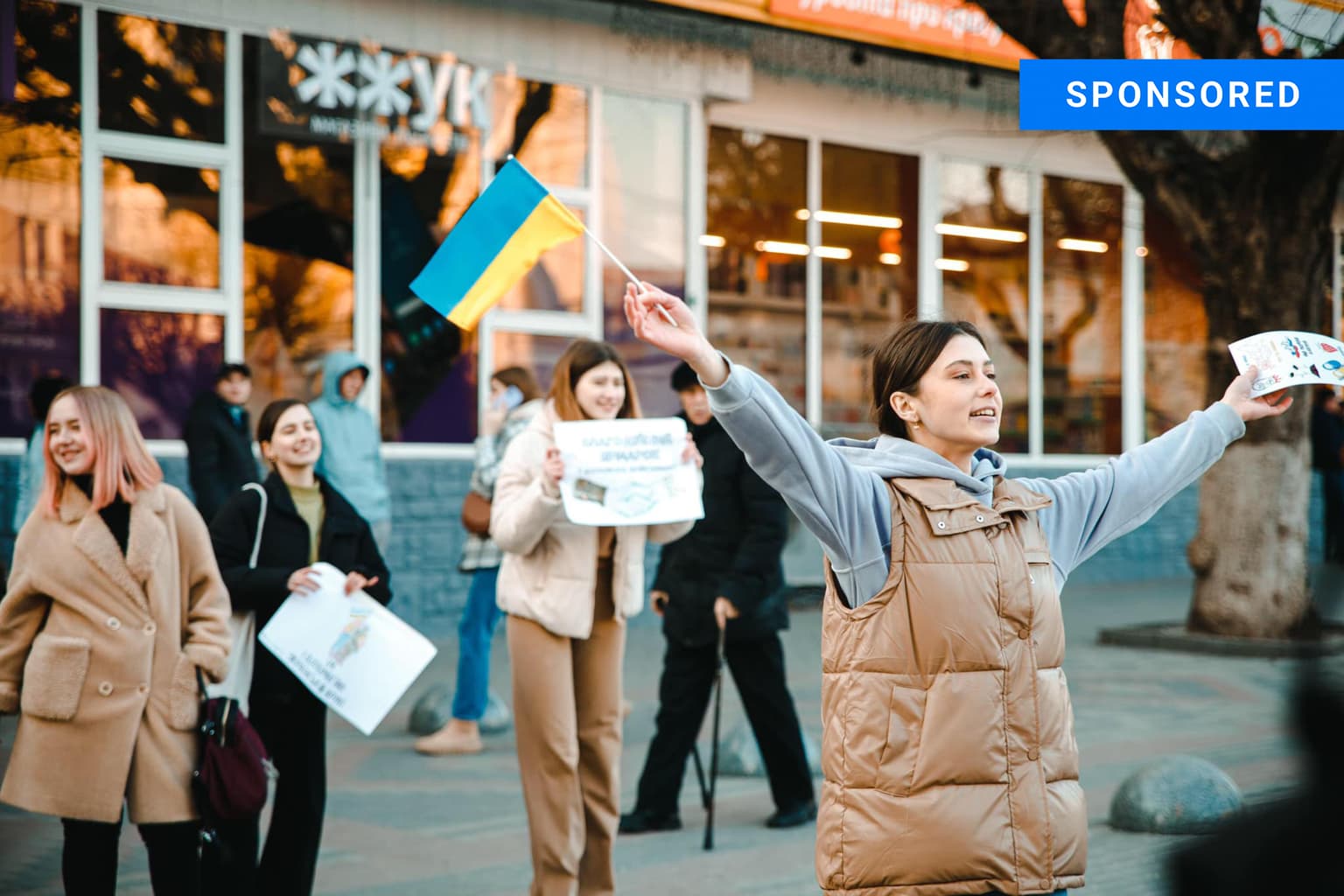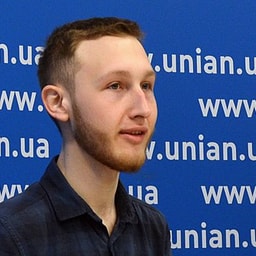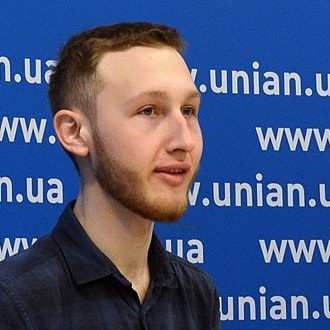How young women are driving Ukraine’s civil society during war

Editor’s Note: This story was sponsored by Internews Ukraine and UN Women Ukraine within the project to strengthen the capacity of young women from Donetsk and Luhansk oblasts. The UN Women is part of the United Nations Recovery and Peacebuilding Programme (UN RPP), which is being implemented by four UN agencies and is suppored by the EU, the European Investment Bank, the U.S. Embassy in Ukraine, and the governments of Canada, Denmark, Germany, Japan, the Netherlands, Norway, Poland, Sweden & Switzerland.
Creative executive Yaryna Vyshenska, 27, was on vacation in Turkey when she woke up on Feb. 24 to the news that Russia had started a full-fledged invasion of Ukraine.
As the war progressed, she built a nonprofit to contribute to Ukraine’s fight by helping those Ukrainian women, men and children who suffered sexual violence from Russian soldiers. Within just weeks, Vyshenska had brought together a team of 17 people and raised over Hr 2 million ($55,000), despite little experience in the non-profit sector.
Vyshenska’s story is not unique. Millions of Ukrainians became volunteers overnight. From helping people relocate to funding equipment for army volunteers, civic initiatives have been an essential part in Ukraine’s fight against Russian aggression. And many of these efforts are led by young women.
In partnership with non-governmental organization Internews-Ukraine and the UN Women Ukraine, the Kyiv Independent tells the stories of three nonprofits and their young women leaders.
Supporting sexual violence survivors – Sylni charity foundation

Yaryna Vyshenska, 27, the creative executive and founder of the charity foundation Sylni. (Courtesy of Yaryna Vyshenska)
Among the war crimes allegedly committed by the Russian military in Ukraine, there are multiple accusations of conflict-related sexual violence. The UN Office of the High Commissioner for human rights has received reports of 124 alleged acts of conflict-related sexual crimes, but the real number of cases is likely much higher due to the inability to collect data from areas of active hostilities and temporarily occupied territories.
Some experts believe that Russian troops deliberately use sexual violence as a weapon and tactic of war, which is prohibited by international law. These crimes mostly target young girls and women, though there have been reports of men and young boys being subject to sexual violence as well.
Young women are more vulnerable to conflict-related sexual violence in both private and public places.
A UN Women study conducted in the war-affected oblasts of Ukraine in 2020 showed a correlation between the proximity to the contact line, active military actions, increased military presence and high risks of sexual harassment and other forms of sexual violence against young women in public spaces. This happens as young women in conflict-affected areas may lose the protection of their families and communities, which places them at greater risk.
Read also: ‘Hide the girls’: How Russian soldiers rape and torture Ukrainians
The foundation Sylni (meaning “Strong” in Ukrainian) is among the organizations that set out to help Ukrainians who have suffered from conflct-related sexual violence. Founder Vyshenska, 27, says she was prompted to start the initiative by the stories of violence that emerged from liberated Ukrainian territories in late March-early April.
Sylni built their organization remarkably quickly. The core team now includes 17 people (all of them women, though they have attracted help from men as well). The foundation offers three types of support to sexual violence survivors – medical, psychological, and legal assistance. With money from donations, the charity is able to support some of the assistance on its own, while also seeking lawyers and medical institutions willing to work pro bono.
A major challenge for Sylni’s work is reaching the people who are in need of their help.
Vyshenska says that due to the stigmatization of the survivors of sexual violence, women often do not seek help for fear of public condemnation and being labeled as a victim. Some survivors also think their personal problems are too insignificant compared to Ukraine’s current struggle.
That is why Sylni is also working to spread awareness about sexual violence – by putting out social media ads and distributing brochures in public toilets. A toilet is the most private and safest place, where reading a brochure about sexual violence will not attract unwanted attention, Vyshenska explains.
All of Sylni’s team are volunteers – Vyshenska herself volunteers while also working full-time as the head of a creative agency.

A photographer and a photo editor Olha Kami (L) and a film production mixing engineer assistant and dialog editor Maria Zubova (R) are among other young women from different fields who joined Sylni, an initiative helping survivors who suffered sexual violence from Russian soldiers. (Courtesy of Yaryna Vyshenska)
Vyshenska believes the war has empowered women, particularly young women, to become leaders in their communities and in the whole country. She recalls having been perceived with skepticism due to her young age and gender a few years ago, but she said she hasn’t faced these issues since Russia’s full-scale invasion broke out, as women’s participation has become essential for the country’s survival in all spheres of social life.
Vyshenska believes this trend will persist even after the war is over – it’s an unforgettable experience, one which will make it impossible for the society to dismiss women’s leadership again, she says.
To help Sylni support Ukrainian victims of sexual violence, you can spread the word about their activity, particularly by helping reach people potentially impacted by sexual violence, or make a financial contribution.
Protesting rape – #stopwarrapeUKR project

Oksana Hnatenko, 22, the co-founder of the movement against gender-based conflict-related violence during Russia's war in Ukraine #stopwarrapeUKR. (Courtesy of Oksana Hnatenko)
On Feb. 24, Oksana Hnatenko, 22, woke up from missile strikes in her city of Kharkiv, located just 40 kilometers from the Russian border. The city has been heavily bombarded since, forcing Hnatenko to spend days and nights in a bomb shelter, deprived of basic necessities. Hnatenko later decided to flee and eventually settled in Germany.
Soon, along with U.S. activist June Kathryn Minix, Hnatenko founded #stopwarrapeUKR, an initiative to protest conflict-related sexual violence against Ukrainian women. Its main aim is to draw attention to the problem of Russian soldiers being en mass accused of raping Ukrainian women and girls during the invasion with demonstrations around the world. They were inspired by the protests organized by women in Lithuania, Latvia and Estonia in mid-April.
The initiative is more an informal movement than a full-fledged organization, Hnatenko says. As they hold demonstrations, they also inspire other women to act. Hnatenko notes that just within one weekend in late May, they organized rallies in over 30 locations across the world, from the United States and Canada to Panama and Australia.
Protesters gather outside Russian embassies, international organizations’ headquarters, and other locations. They use various creative means along with makeup to visualize the wounds that sexual violence survivors may have.

Women activists with their bodies covered with imitation of blood traces represent Ukrainian rape victims as they protest against sexual crimes allegedly committed by the Russian military in the ongoing full-scale war in Ukraine within the #stopwarrapeUKR initiative in Edmonton, Canada, on May 29, 2022. (Courtesy of Oksana Hnatenko)
“The atrocities of the war gave Ukrainian women the strength and courage to fight on the battlefield of public opinion,” Hnatenko says. “Therefore, the role of women is much more important in the decision-making process and in support of Ukraine as the majority of victims of conflict-related violence are women and girls.”
To help advance the mission of the #stopwarrapeUKR project, you can donate to efforts providing psychological and medical help to sexual violence victims in Ukraine such as the Nova Ukraine organization, or you can join the movement and organize a rally in your city.
Helping young people integrate into local community – Youth Center Volyn

Veronika Mishchuk (R),18, the head of the non-profit Youth Center Volyn. (Courtesy of Veronika Mishchuk)
Veronika Mishchuk studies management at the Lutsk National Technical University but now the 18-year-old woman spends most of her time leading the Youth Center Volyn.
Lutsk, a regional capital in northwestern Ukraine, became one of the destinations for internally displaced people from the country’s east and south after Russia launched a full-scale invasion of Ukraine. The Youth Center Volyn nonprofit is now working to support internally displaced persons, who settled in Lutsk, while continuing its mission of local youth development.
Like millions of other Ukrainians, Mishchuk woke up early on Feb. 24 to the sounds of explosions. As soon as she got to a safer location in the city, she began creating a plan for how her organization could help.
The center’s work changed drastically in the first month of the full-scale war. “While before we worked on empowering the youth, now we had to ensure young people could survive,” Mishchuk recalls. They helped the military, such as by finding equipment and focused on assisting internally displaced people.
The Youth Center Volyn helps run shelters for internally displaced persons. Within three months, they have set up six shelters, providing food, hygiene items, and other resources. They have helped over 500 people, most of them women and children, since the all-out war began.
The organization has also organized various cultural activities like English-language learning clubs and various workshops. These events help internally displaced persons to integrate into the local communities and better cope with their trauma and stress, Mishchuk says.
The center has around 50 volunteers and is supported by international funding, including a grant from the United Nations. Mishchuk devotes much of her time to looking for new resources to continue their work.

Children play on the bunk bed in a shelter for internally displaced persons in Lutsk, Volyn Oblast, on May 20, 2022. The Youth Center Volyn helps cover the shelter's needs. (Courtesy of Veronika Mishchuk)
Three months into the war, Youth Center Volyn has also resumed work on its mission to help the long-term development of the region’s young people, such as providing informal education. Their mission is to help 100,000 young people in Ukraine find their calling, and they are actively looking for resources to advance this mission.
Mishchuk believes the war has propelled the role of women in local decision-making, empowering them to lead. She is one of the many leading those in need as Ukraine fights Russian aggression.
To support Youth Center Volyn’s mission, you can donate to humanitarian help for internally displaced persons in the region — send a PayPal transfer to zakharii.tkachuk@gmail.com. (Zakharii Tkachuk is the head of the Youth Platform, an allied organization).
To learn more about the role of young women in Ukraine’s society and the challenges they face, watch this video developed by Internews Ukraine and sponsored by UN Women Ukraine.

Women play a leading role in recovery, peacebuilding, and conflict resolution. Therefore UN Women calls on the members of governments, representatives of diplomatic missions, international organizations, and the world community to:
- Prioritize funding for women's organizations so that they continue to work, as they provide vital support to their communities.
- Ensure that young women are included in coordination mechanisms and decision-making processes so that their priorities are included in the humanitarian response effort and benefit from the humanitarian support provided.
- Provide the necessary support to women so that they can adapt to the changing context and provide new services.
- Ensure that the current differentiated needs of young women in Ukraine are taken into account and included in planning the next steps in responding to the impact of war on women and girls in Ukraine.
This story was sponsored by Internews Ukraine and UN Women Ukraine within the project to strengthen the capacity of young women from Donetsk and Luhansk oblasts. The UN Women is part of the United Nations Recovery and Peacebuilding Programme (UN RPP), which is being implemented by four United Nations agencies: the United Nations Development Programme (UNDP), the UN Entity for Gender Equality and the Empowerment of Women (UN Women), the United Nations Population Fund (UNFPA) and the Food and Agriculture Organization of the United Nations (FAO).
Twelve international partners support the Programme: the European Union (EU), the European Investment Bank (EIB), the U.S. Embassy in Ukraine, and the governments of Canada, Denmark, Germany, Japan, the Netherlands, Norway, Poland, Sweden & Switzerland.










